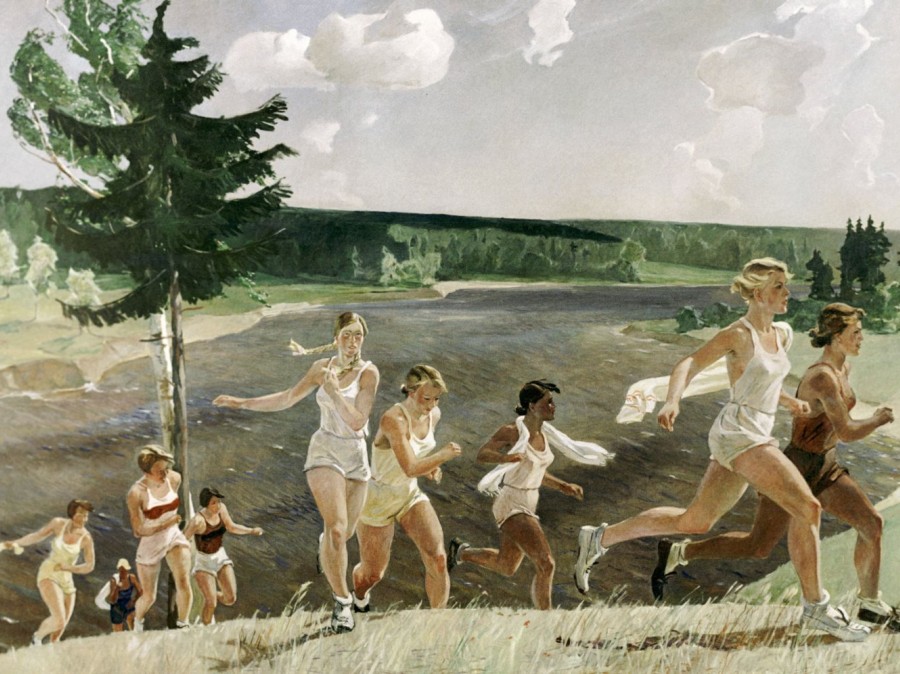Idyll and Utopia

Reproduction of painting Expanse by Alexander Deineka
SPUTNIK / Alamy Stock Foto
Idyll and utopia both refer to depictions of the satisfaction of needs in a temporal and spatial displacement. The idyll typically portrays a simple, peaceful natural state, often projected into a reconciled past on a small scale; by contrast, the “non-place” of the large-scale utopian society has often been located in a spatial distance from existing society, often looking into a possible future. We are interested in the literary, historical, political, and religious traditions of idyll and utopia, as well as in their contemporary forms and meaning. Our interdisciplinary graduate student conference will be concerned with these characteristics, commonalities and differences throughout the centuries.
Friday, October 8th
9:00am (EST) Welcome and Introductory Remarks
Panel 1: Utopia and Idyll in Critical Theory
(Moderator: Barbara Nagel, Princeton)
9:30-11:00am Viewing Time
11:00-11:45 Discussion 1: Philosophical Perspectives on Idyll and Utopia
• Lea Fink (Berlin): Utopia and Remembrance Prospective Anticipation and Retrospective ‘Eingedenken’ in Bloch’s and Benjamin’s Philosophy
• Haziran Zeller (Kiel): Bloch, Adorno and the Nexus of the Whole
11:45-12:30pm Discussion 2: Utopia and Idyll in Literature and Critical Theory
• Gesa Jessen (Berlin): Small Town Glory. Adorno reads Mörike
• Vojin Saša Vukadinović (Berlin): To Begin Anew: Utopia as a Violent Anti-Idyll in Monique Wittig’s Les Guérillères (1969)
12:30-1:30pm Lunch/Dinner
1:30-3pm Keynote: Dr. Caroline Edwards (Birkbeck, University of London)
(Respondent: Devin Fore, Princeton)
Idyll & Utopia in the Era of Ecocatastrophe: Elemental Utopian Becomings
This lecture will consider how the image of utopia is being reformulated in our contemporary moment of ecocatastrophe. In recent years, scholars have advocated a process-oriented approach to conceptualising the utopian impulse, as differentiated from the literary genre of utopia understood as imagining (more) perfect worlds in other times and places. However, the posthuman and nonhuman dimensions of utopian becoming have been overlooked in recent utopian theory; at a time when we urgently need to galvanise our readings of hopeful post-anthropocentric perspectives.
This talk will consider what an elemental analysis of nonhuman agents such as the lithic and the mycological adds to our understanding of contemporary utopian becomings. I argue that an elemental analysis of utopian becoming reveals the residual lingering of older utopian genres and modes, alongside new materialist interventions into environmental, infrastructural, and ecological entanglements. Drawing on Ernst Bloch’s theorisation of the hope principle, I will consider productive examples of what I call “elemental non-contemporaneity” within contemporary fiction, TV series, multimedia artworks, installations, and queer and black utopian theory.
Zoom Video of Keynote October 8th
Saturday, October 9th
Panel 2: Historical & Literary Figurations of Idyll and Utopia
(Moderator: Johannes Wankhammer, Princeton)
8:30-10:00am (EST) Viewing Time
10:00-10:45am Discussion1: Historical Perspectives
• Hanna Zoe Trauer (Berlin): Between Heaven and the Holy Land: Utopia in Medieval Jewish Imagination
• Patrick Rummel (Marburg): A ‘Global Utopia’? – Greater Britain, Victorian Empire Federalists, and the ‘Idyll’ of Ancient Greek Colonization
11:00-11:45am Discussion 2: Literary Figurations
• Marie Helen Klaiber (Berlin): The Critical and Political Potential of the Poetic Idyll in a Selection of Poems by Martin Opitz
• Benjamin Heller (Yale): Arcadia in German Realism - Pastoral Tradition in Wilhelm Raabe’s Stopfkuchen
11.45 - 12.45 Lunch/Dinner Break
Panel 3: Utopia and Idyll Today
(Moderator: Konstantin Haensch, Princeton)
12:45-1:30pm Viewing Time
1:30-3:00pm Discussion & Outlook
• Michael Navratil (Stuttgart): Nine-Eleven in Utopia. Creative Capitalism as Idyll and Virtual Catastrophes in Leif Randt’s Schimmernder Dunst über CobyCounty




